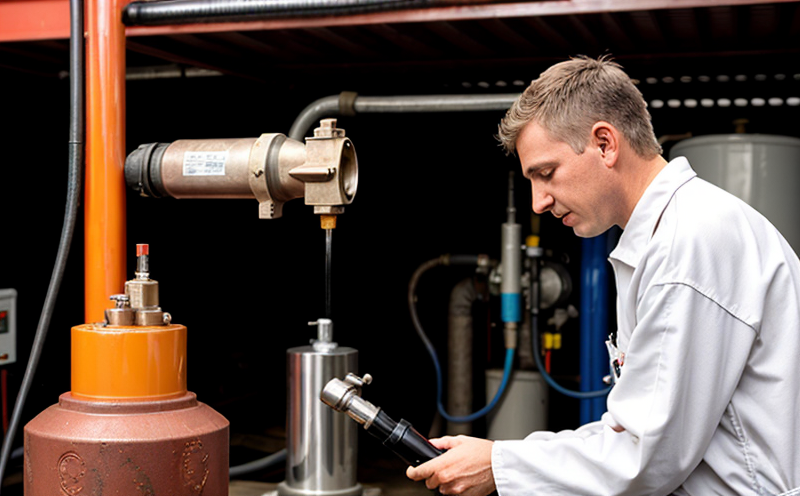ASTM D7328 Rapid Conductivity Testing of Aviation Fuels
The ASTM D7328 standard method is a critical procedure used in the aerospace and aviation sectors to ensure that aviation fuels meet stringent quality requirements. This rapid conductivity testing is essential for maintaining engine performance, preventing contamination, and ensuring fuel compatibility within aircraft systems.
Conductivity in aviation fuel serves as an indicator of impurity levels such as water, particulates, and other contaminants. The presence of these impurities can lead to reduced fuel efficiency, corrosion, and potential operational hazards. ASTM D7328 provides a quick, reliable method for measuring the conductivity of aviation fuels, which is particularly important given the high standards required in this sector.
The test involves titrating the fuel with deionized water until the conductivity reaches a specific value. The amount of water added to achieve this point directly correlates to the impurity level present in the fuel sample. This method provides an immediate indication of fuel quality, enabling rapid decision-making for quality control and maintenance.
The testing process is conducted using specialized equipment that can rapidly analyze multiple samples simultaneously. This capability allows laboratories to provide timely results, which are critical for compliance with international standards such as ISO 9001:2015 and AS9100C. The use of ASTM D7328 ensures consistency across various testing facilities, enhancing reliability and traceability in the aviation industry.
Compliance with this standard is particularly important for airlines and aerospace manufacturers who must adhere to stringent quality control measures. By ensuring that their fuel meets these standards, they can avoid costly disruptions due to fuel-related incidents or maintenance issues.
In conclusion, ASTM D7328 rapid conductivity testing plays a vital role in maintaining the integrity of aviation fuels. Its ability to quickly and accurately measure impurity levels ensures that aircraft engines operate efficiently and safely, which is paramount for this critical industry. The reliability and consistency provided by this method are essential for meeting international standards and ensuring operational safety.
Benefits
Implementing ASTM D7328 rapid conductivity testing offers several key advantages:
- Improved Fuel Quality Control: Ensures that aviation fuels meet the highest quality standards, reducing the risk of contamination and ensuring optimal engine performance.
- Rapid Decision-Making: The quick results provided by ASTM D7328 enable laboratories to make timely decisions regarding fuel acceptance or rejection, minimizing downtime and operational disruptions.
- Increased Reliability: By consistently meeting the quality standards set forth in ASTM D7328, airlines and aerospace manufacturers can enhance their operational reliability and safety.
- Cost Efficiency: Preventing fuel-related issues through early detection saves on maintenance costs and potential emergency repairs.
The use of this standard also ensures compliance with international standards such as ISO 9001:2015 and AS9100C, enhancing the reputation and credibility of testing laboratories in the aerospace sector.
International Acceptance and Recognition
The ASTM D7328 standard has gained widespread acceptance and recognition within the international aviation community. It is widely used by quality managers, compliance officers, R&D engineers, and procurement teams across various aerospace and aviation companies.
This standard is recognized not only in North America but also internationally, including Europe, Asia, and other regions where aviation fuel testing is critical. The acceptance of ASTM D7328 ensures that laboratories providing this service are aligned with global best practices, enhancing their credibility and marketability.
The use of ASTM D7328 is mandated by several international authorities, including the International Civil Aviation Organization (ICAO) and the European Union Aviation Safety Agency (EASA). Compliance with these standards is essential for aviation companies to maintain operational licenses and certifications. The widespread adoption of this method underscores its importance in ensuring fuel quality across borders.
By adhering to ASTM D7328, laboratories can ensure that their testing results are accepted worldwide, facilitating seamless operations and international collaboration within the aerospace industry.
Use Cases and Application Examples
| Use Case/Application Example | Description |
|---|---|
| Airline Fuel Quality Control: | ASTM D7328 is used to monitor fuel quality at various stages of the supply chain, ensuring that fuel meets the required standards before it is loaded into aircraft. |
| R&D and Development: | This method is utilized in R&D laboratories to test new aviation fuels and additives, ensuring they meet or exceed ASTM D7328 conductivity specifications. |
| Procurement and Supply Chain Management: | ASTM D7328 helps procurement teams ensure that the fuel suppliers are meeting quality standards, reducing the risk of substandard products entering the supply chain. |
| Maintenance and Repair: | This test is conducted periodically during aircraft maintenance to detect any changes in fuel quality that could impact engine performance or safety. |
- Contamination Monitoring: ASTM D7328 can be used to monitor the level of contamination in aviation fuels, which helps in identifying potential sources of impurities and taking corrective actions.
- New Fuel Development: The standard is applied during the development of new fuel blends or additives to ensure they meet conductivity specifications.





